Key takeaways:
- Anti-war activism transcends merely opposing military actions; it focuses on advocating for peace and healing through shared human experiences.
- Personal experiences and storytelling, including poetry, play a crucial role in fostering connections and inspiring collective action against war.
- Public poetry performances serve as powerful platforms for raising awareness about the realities of war, engaging communities, and igniting dialogues around shared suffering.
- Poetry acts as an effective tool in activism by cultivating empathy and solidarity, helping individuals connect on deeper emotional levels and compelling them to take action.
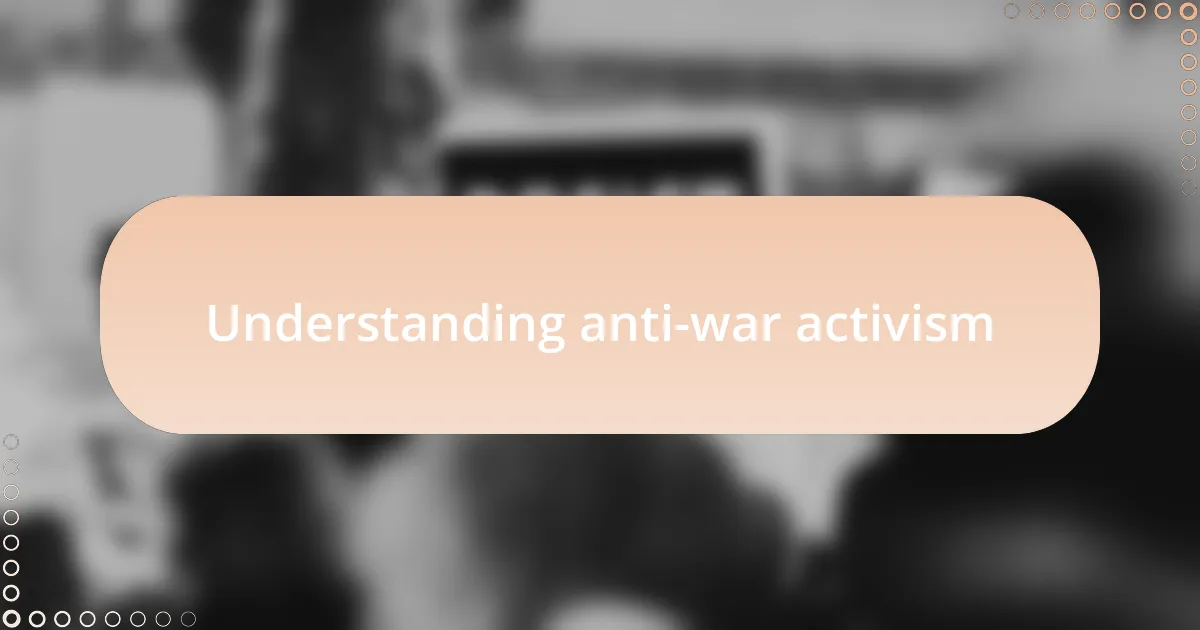
Understanding anti-war activism
Anti-war activism is rooted in the conviction that conflict leads to suffering and devastation, fundamentally challenging the systems that perpetuate violence. Reflecting on my own experiences, I’ve often been struck by the stories shared during protests—each voice representing a life impacted by war. It makes me wonder, how can we ignore the humanity in these narratives when they resonate so deeply within us?
I recall attending a local rally where a veteran spoke about the toll of combat, not just on soldiers but on families and communities. Listening to him, it became clear that anti-war activism isn’t just about opposing military action; it’s about advocating for peace and healing. This collective emotional journey often fosters a community that is united in its desire for a better world.
The beautiful complexity of anti-war activism lies in its ability to bring together diverse perspectives. In my interactions, I’ve met artists, educators, and everyday individuals, each motivated by personal stories that fuel their resolve to stand against war. Isn’t it fascinating how our unique experiences can converge to form a powerful movement that challenges societal norms?
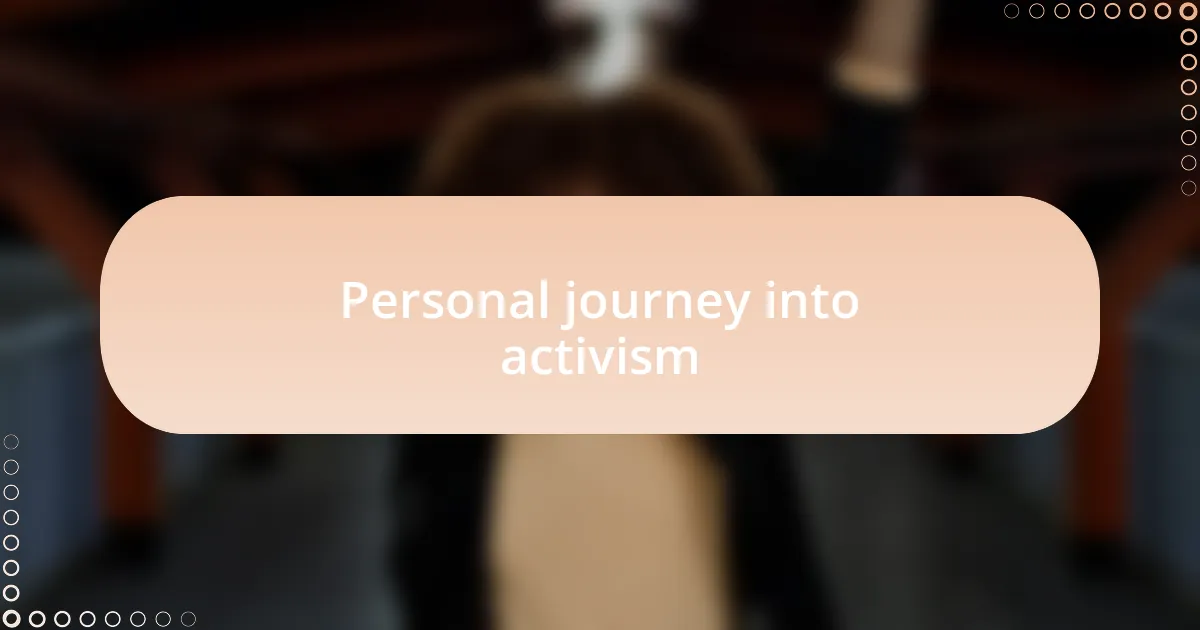
Personal journey into activism
As I reflect on my personal journey into activism, I realize it began with a profound sense of injustice that I felt witnessing the effects of war firsthand. I remember volunteering at a local shelter for refugees displaced by conflict; their stories echoed in my mind long after I left each day, igniting a fire within me to push for change. Those interactions taught me that activism isn’t merely a choice—it’s a responsibility to stand with those who have been silenced.
One pivotal moment for me was during a poetry reading where I shared a piece inspired by a friend’s experience growing up in a war zone. As the words flowed from my pen, I felt the collective energy of the audience, a mix of sorrow and hope, radiating back. I realized then that art holds an incredible power—it can bring people together and spark conversations that challenge the status quo. Have you ever felt that electrifying connection when sharing something so deeply personal?
Over time, these experiences fostered an unshakeable belief in the importance of using my voice. I began participating in more demonstrations and gatherings, each step further intertwining poetry and activism in my life. I could see the difference it made, how sharing our stories can amplify the message of peace and inspire others to join the fight against war. It feels so fulfilling to know that each poem, each protest, is part of a larger narrative that seeks to rewrite the story of humanity.
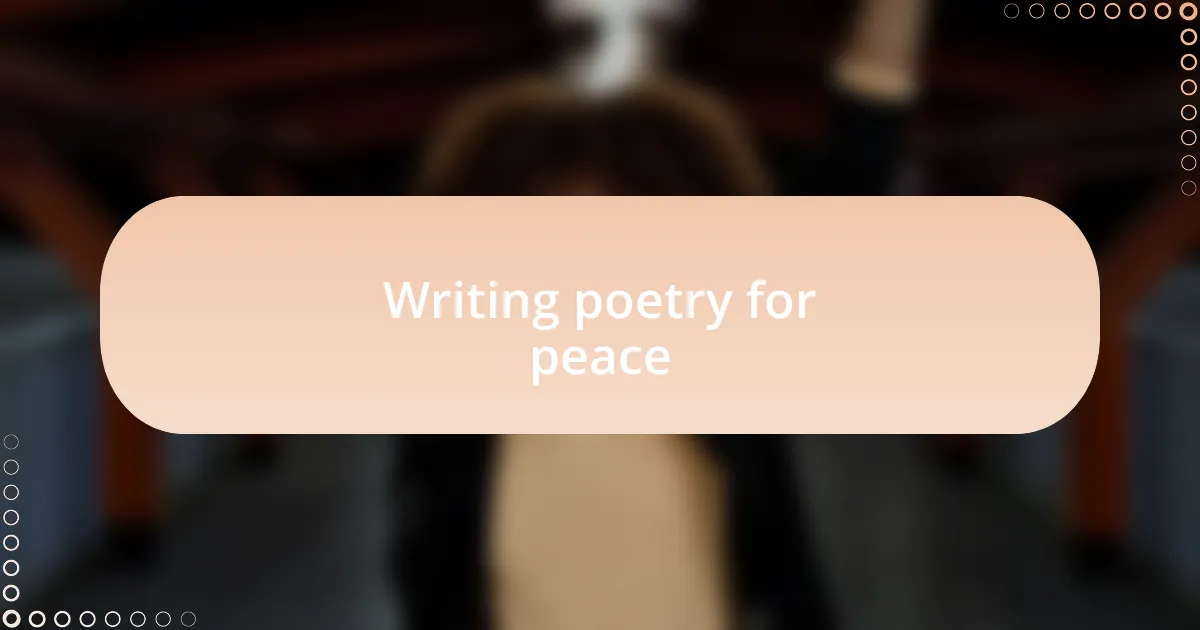
Writing poetry for peace
Writing poetry for peace has become a pivotal avenue for my activism. I vividly recall one late night, surrounded by candlelight, pouring my heart into a poem about the pain of a mother losing her child to violence. The catharsis in those verses was palpable; it was as if I was not only expressing sorrow but also calling for a collective awakening. Who would not feel compassion when faced with such stark realities?
In another instance, I hosted a community poetry workshop aimed at fostering dialogue among various cultural groups affected by conflict. As participants shared their verses, I was struck by the universal truths that emerged; love, loss, and hope intertwined in ways that transcended borders. Have you ever noticed how poetry can reveal the common threads of our humanity, even amid deep divisions?
The act of writing these poems often feels like a quiet revolution. Each line I craft is not just a reflection of inner turmoil; it is a rallying cry for peace. That moment when I share a new piece at an open mic, watching the audience lean in with interest, reminds me of the profound impact that words can have. They are bridges, connecting hearts and inspiring action in ways that mere rhetoric cannot.
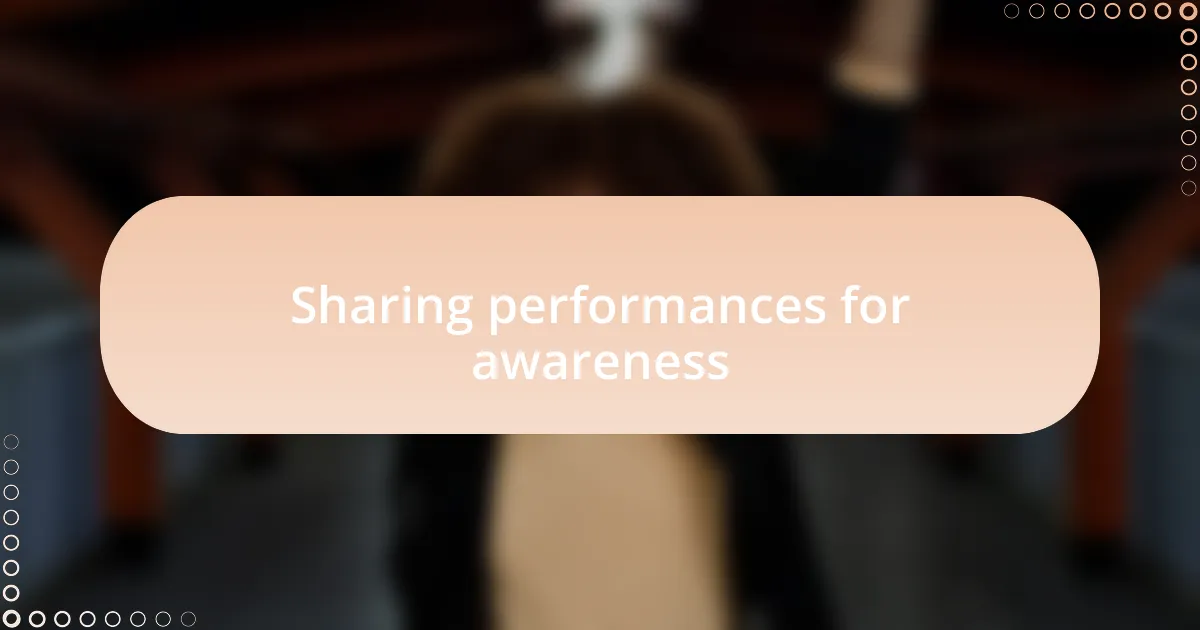
Sharing performances for awareness
Sharing my poetry in public performances has been an integral part of spreading awareness about the realities of war. I remember the electrifying atmosphere during one particular event where I recited a piece about the soldiers’ dreams interrupted by the chaos of battle. The way the audience sat in rapt silence, leaning forward as if to absorb every word, truly revealed to me how performance can turn personal expressions into collective experiences.
At times, I’ve invited survivors of war to share the stage alongside me. I distinctly recall a moment when a father shared his heartbreaking story about fleeing his homeland with nothing but his child clutched in his arms. The vulnerability and honesty in his delivery not only captivated us but also opened the floodgates for a broader conversation about displacement. Isn’t it powerful to witness how shared stories can unite us in empathy, illuminating the hidden costs of conflict?
One memorable performance involved a local library where we transformed the space into a sanctuary of voices. The energy in that room felt almost surreal; it was as if we were all part of a larger movement. Each poem read sparked questions, discussions, and even tears, reminding us all that sharing art—especially about such profound subjects—can serve as a vital catalyst for awareness and change. How often do we get the chance to witness hearts and minds evolving right before our eyes?
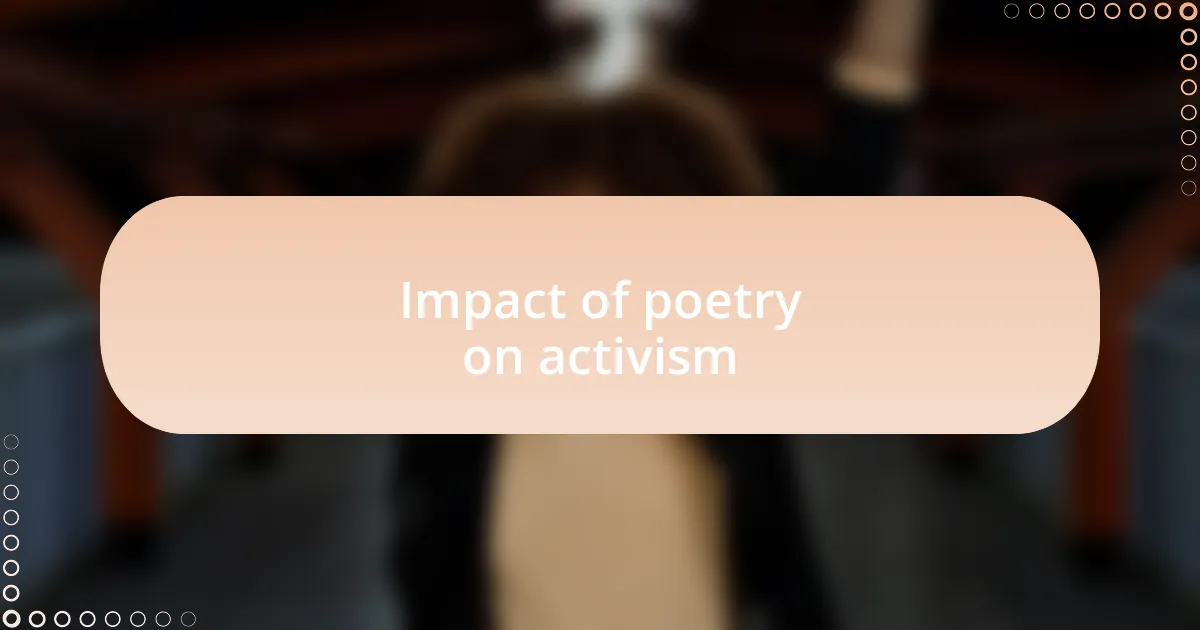
Impact of poetry on activism
There’s something uniquely transformative about poetry that makes it an effective tool for activism. I vividly recall a performance where I recited a piece reflecting on the dreams shattered by war, and the crowd responded with tears and nods of understanding. That moment taught me how words can speak to deeper truths, transcending barriers and igniting passion in ways statistics never could.
In a different instance, I hosted an open mic night specifically focused on anti-war themes. It was incredible to see individuals from diverse backgrounds share deeply personal stories intertwined with their poetic voices. Each narrative was a thread in the fabric of our collective experience, weaving a tapestry that illustrated the human suffering caused by war. How impactful is it to realize that through poetry, we can create connections that foster solidarity and provoke meaningful discussions?
I also remember a peaceful protest where I recited a poem dedicated to those lost in armed conflict. The atmosphere was charged with emotion; participants were holding candles, their faces illuminated with a sense of shared purpose. It highlighted for me how poetry doesn’t just inspire; it also cultivates a sense of community, compelling people to act and stand together for a cause greater than themselves. Isn’t that the essence of activism? To unite and galvanize hearts through the power of poetic expression?